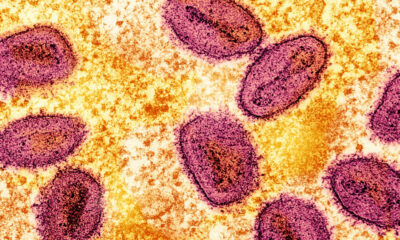Health
Finnish Researchers Achieve Breakthrough in Heart Disease Gene Therapy

Researchers from the University of Eastern Finland have reported a promising advancement in gene therapy aimed at treating patients suffering from refractory angina, a severe form of chronic chest pain. The findings emerged during a mid-stage clinical trial conducted in Seville, Spain, and highlight the potential of this innovative treatment to significantly improve the quality of life for individuals with this challenging condition.
Refractory angina affects many patients with coronary artery disease who do not respond to standard treatments. The research team conducted a study involving patients whose symptoms persisted despite conventional therapies, seeking to assess the efficacy and safety of the gene therapy approach. The mid-stage results indicate a positive response, leading to improved heart function and reduced pain levels among participants.
The gene therapy involves the introduction of a specific gene into the heart tissues, enabling the body to produce proteins that promote the formation of new blood vessels. This process is crucial for enhancing blood flow to the heart, which can alleviate the symptoms of angina. The preliminary results have shown that the therapy not only addresses the symptoms but may also contribute to long-term cardiovascular health.
In total, the study included a cohort of patients who were monitored over a period of six months. Researchers noted a significant decrease in angina episodes among those receiving the gene therapy compared to the control group. This advancement marks a significant milestone in heart disease treatment, as it opens new avenues for patients who have limited options available.
The research team aims to proceed with further stages of clinical trials to gather more comprehensive data on the long-term effects of this gene therapy. They emphasize the importance of rigorous testing to ensure safety and effectiveness before the treatment can be made widely available. Additionally, the team is exploring potential adjustments to the therapy to optimize outcomes for diverse patient profiles.
The findings have garnered attention not only for their potential impact on patient care but also for their contribution to the broader field of cardiovascular research. Heart disease remains a leading cause of mortality worldwide, and innovative treatments such as this gene therapy could play a vital role in addressing this ongoing health crisis.
As the research progresses, the team at the University of Eastern Finland is hopeful that their work will pave the way for new therapeutic strategies that could benefit countless individuals suffering from refractory angina. The results are expected to be published in a peer-reviewed medical journal in the coming months, providing further insight into the implications of this gene therapy for treating heart disease.
-

 Technology4 months ago
Technology4 months agoDiscover the Top 10 Calorie Counting Apps of 2025
-

 Health2 months ago
Health2 months agoBella Hadid Shares Health Update After Treatment for Lyme Disease
-

 Health3 months ago
Health3 months agoErin Bates Shares Recovery Update Following Sepsis Complications
-

 Technology3 weeks ago
Technology3 weeks agoDiscover 2025’s Top GPUs for Exceptional 4K Gaming Performance
-

 Technology4 months ago
Technology4 months agoDiscover How to Reverse Image Search Using ChatGPT Effortlessly
-

 Technology2 months ago
Technology2 months agoElectric Moto Influencer Surronster Arrested in Tijuana
-

 Technology4 months ago
Technology4 months agoMeta Initiates $60B AI Data Center Expansion, Starting in Ohio
-

 Technology4 months ago
Technology4 months agoRecovering a Suspended TikTok Account: A Step-by-Step Guide
-

 Health4 months ago
Health4 months agoTested: Rab Firewall Mountain Jacket Survives Harsh Conditions
-

 Lifestyle4 months ago
Lifestyle4 months agoBelton Family Reunites After Daughter Survives Hill Country Floods
-

 Technology3 months ago
Technology3 months agoUncovering the Top Five Most Challenging Motorcycles to Ride
-

 Technology4 weeks ago
Technology4 weeks agoDiscover the Best Wireless Earbuds for Every Lifestyle





















